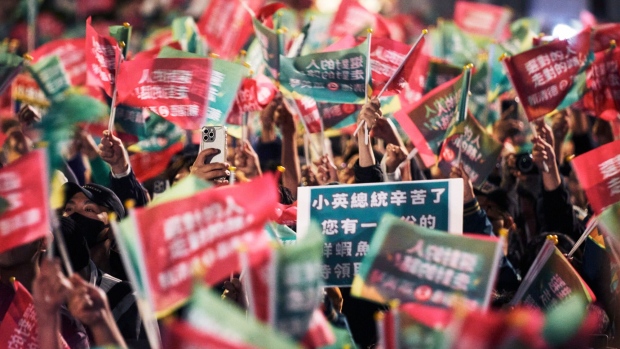Jan 14, 2024
Xi’s Taiwan Strategy in Tatters After Winnable Vote Slips Away
, Bloomberg News

(Bloomberg) -- The moment Chinese President Xi Jinping’s prospects fell apart for a favorable outcome in Taiwan’s election came not this weekend, but at a luxury hotel in downtown Taipei on a Thursday evening in November.
In a Grand Hyatt conference room, opposition figures who favor restarting talks with China met for talks to hammer out a joint ticket that gave them a better chance of winning the election. That deal imploded in a televized volley of public insults that’s gone down as an unprecedented moment of chaos in Taiwanese politics.
The ramifications were evident in Taiwan’s tightest election in decades on Saturday. Voters returned the US-friendly ruling party to power, despite frustrations over the Democratic Progressive Party’s handling of the economy and rising military tensions with Beijing. No party had previously ever won three terms in a row.
The victor’s margin emphasized Xi’s missed opportunity. Current Vice President Lai Ching-te, who Beijing has branded an “instigator of war,” took just 40% of the tally. Had his rivals been able to cement an alliance, Taiwan would likely be facing a new leadership team that wants to forge closer ties with Beijing.
That failure to take advantage of agreeable conditions in Taiwan’s political landscape also exposed how little China’s intimidation of the island it considers its own has swayed public opinion. Since the last election, Beijing has sent rockets over Taiwan, put fresh pressure on Taipei not to engage with US officials, and tried to leverage its huge economy to coerce the chip hub into greater compliance.
“Beijing faces two options,” said Wen-ti Sung, a political scientist with the Australian National University. “Carrying on with military and economic sticks that continue to fail to work, or switching gears to find another way to exist peacefully with Taiwan.”
China’s path will depend on its government’s perceived political security, he added: “A more self-confident leadership may be better able and willing to experiment with a new approach.”
Xi’s options are also constrained by China’s domestic conditions. The world’s second-largest economy is undergoing its most severe slowdown in decades, as the property market that was once a driver of growth drags on almost all pockets of activity.
A corruption crisis within the Rocket Force that would be crucial to any invasion of Taiwan has reduced the threat of a potential Chinese attack. The graft is so extensive that US officials now believe Xi is less likely to contemplate major military action in the coming years than would otherwise have been the case, according to people familiar with US intelligence assessments.
How Beijing responds to Lai’s win in the coming months will test its fragile relationship with Washington, Taipei’s main military and political backer. The US has pushed back against China’s efforts to isolate Taiwan diplomatically and economically over the past eight years. President Joe Biden has repeatedly vowed to come to Taiwan’s aid if China were to attack.
Early indications are Beijing is opting for a low-key response. Four Chinese navy vessels and one weather balloon were seen around Taiwan by Sunday morning, according to the island’s defense ministry. No People’s Liberation Army planes were recorded entering Taiwan’s air defense zone by Sunday morning — China often responds to even minor dignitaries visiting Taipei with scores of jets.
China’s Taiwan Affairs Office repeated Xi’s stated aim of unification, and noted without naming Lai that his victory didn’t reflect mainstream public opinion. Four years ago, Chinese state media labeled President Tsai Ing-wen “selfish, greedy and evil” after her landslide reelection.
That muted response is in line with an assessment from national security officials in Taipei ahead of the election that Beijing wouldn’t react strongly in the immediate aftermath, partly due to bad winter weather in the Taiwan Strait.
Another limiting factor the officials cited was China’s desire to avoid derailing a tentative improvement of relations with the US, after years of spiraling tensions. When Xi met Biden last November in California, he told the US leader China didn’t seek a hot war with anyone, while stating Beijing’s long-term goal of unification.
Xi has painted such a strong red line around the Communist Party’s stance on Taiwan that the Chinese leader is unlikely to change course, according to Jennifer Welch, chief geoeconomics analyst at Bloomberg Economics. “It’s more likely Beijing will double down on efforts to isolate Taiwan internationally, divide it internally, and exhaust its resilience,” she said.
What Bloomberg Geo-Economics Says...
“Lai will face a divided government, as he said his party failed to secure a legislative majority. The DPP will need to negotiate with the KMT and/or TPP to pass budgets and legislation, which could slow or hinder the DPP’s ability to advance its agenda. It could also hold up US priorities for Taiwan: when the DPP last held the presidency but lacked a legislative majority (2004-2008), it repeatedly clashed with the KMT over Taiwan’s arms purchases and defense budget.
— Jennifer Welch, analyst
Read the full report here
The split in Taiwan’s powerful legislature that controls budgets for defense spending does give Beijing one bright spot from Saturday’s vote. The Kuomintang and Taiwan People’s Party both won seats, meaning Lai will have to negotiate with the opposition when making crucial decisions about military funding, for example.
If Beijing wants either party to gain ground at the next election, it should try to positively motivate the Taiwanese public into favoring more engagement, said Kharis Templeman, a research fellow at the Hoover Institution at Stanford University.
China has previously barred its tourists from traveling to Taiwan on group tours and banned imports of the island’s agricultural products, such as mangoes and pineapples, in an effort to shift public opinion. “They need to offer carrots as well as sticks,” Templeman said. “There needs to be unconditional benefits to economic engagement.”
As the losing parties licked their wounds this weekend, they showed no sign of rising above the chaos that derailed their campaigns, calling each other liars and scammers.
That kind of squabbling has left China dealing with the DPP for the next four years, with no clear winning partner on the horizon.
--With assistance from Betty Hou.
©2024 Bloomberg L.P.








